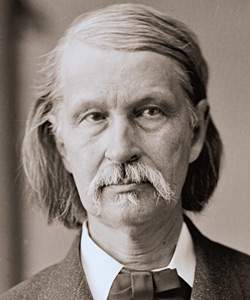Horace Maynard (American National Biography)
Scholarship
The secession crisis created a difficult situation for Maynard. When he met Stephen A. Douglas in the summer of 1860, Maynard suggested that a special House committee with one representative from each state be established to deal with the crisis, a course that was taken in December 1860. Occupying a middle ground, he supported the proposed Crittenden Compromise to create a dividing line between slavery and freedom at 36° 30', declared that he saw no reason why the Union could not continue half free and half slave, and strongly urged the North to listen to the grievances of the South and remove the causes of discontent. At home, he valiantly campaigned against secession, supported Unionists regardless of party, and cooperated with fellow Whigs like William G. Brownlow as well as Democrats like Andrew Johnson, whom he had opposed for years.
Maynard's efforts were crowned with success in East Tennessee, which voted against secession, but the state as a whole joined the South. In August 1861 he won reelection to Congress against a Confederate opponent, only to be forced to flee to the North immediately afterward. In Washington, together with Johnson, Maynard became one of the principal advocates of a Union campaign to liberate East Tennessee, a course of action he ceaselessly urged on the Lincoln administration. In 1863 Johnson, then military governor of Tennessee, appointed him attorney general.
Maynard's efforts were crowned with success in East Tennessee, which voted against secession, but the state as a whole joined the South. In August 1861 he won reelection to Congress against a Confederate opponent, only to be forced to flee to the North immediately afterward. In Washington, together with Johnson, Maynard became one of the principal advocates of a Union campaign to liberate East Tennessee, a course of action he ceaselessly urged on the Lincoln administration. In 1863 Johnson, then military governor of Tennessee, appointed him attorney general.
Hans L. Trefousse, "Maynard, Horace," American National Biography Online, February 2000, http://www.anb.org/articles/04/04-00670.html.



